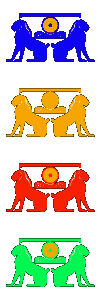



















It is my present belief that Lord Thoth's general habit in this area is to teach His servants the value of purifying the mind through wisdom and other forms of firm and subtle nutrition, and to exercise the powers of goodness though the assumption of worthy challenges and projects. As Thoth is mystically connected with pyramid initiation, we look to this pure geometric monument to remind us that our knowledge should be arranged on an infrastructure of sound, well-layered reason. Joseph Campbell said that the elegant simplicity of his mentors in true religion was that that they taught by question and answer. Hindus call this, upadesha. Though the Lord's human, super-human, and non-human assistants are the keepers of vast fortunes in knowledge and information, its refinement, safeguarding, and dissemination are conducted according to logic- and time-honored scheme. I would compare Thoth's priorities to those of true love. His agenda is inscrutable to anyone whose regard for it is not of a sufficiently innocent, competent, and enthusiastic quality. Egyptian society was a nepotistic meritocracy but, as a theocracy, its moral and ethical problems were not as terrible as of any other nation. Still, there are obscure questions, different ones, and those who understand them transmit answers to their students via symbolic, even encrypted means.
One morning, I came home to find an old friend had taken shelter of Lord Thoth's house. Nothing seemed amiss. I bathed, lit incense, and went to sleep. Some hours later, I awoke to the odor of sour socks, my sense of smell heightened by a trip to dreamtime. It was almost overwhelming, and part of my mind was in a mild panic. I then heard a voice say, "Stretch!" So, I did a tiny bit of yoga and tai chi posturing, and the pain vanished. I went downstairs, removed the socks from the shoes, and placed them into his suitcase. I was highly amused with this sequence of events, but I did not wake him with any insulting recap of them. At some more graceful time would I more carefully explain to visitors with associate status the need of Thoth's house for a pristine atmosphere? If the need arose, I would. As the layers of a pyramid must be perfectly sequential, the education of a shaman is as progressively layered as that of a physician or psychologist. Just how much attention to give to this or that concern when you have an ongoing ritual regimen is a matter for disclosure according to initiation's arrangement. In most any priesthood teaching advanced alchemy, the need-to-know principle applies. Unnecessary insecurity should not be bred in any of the grades.
